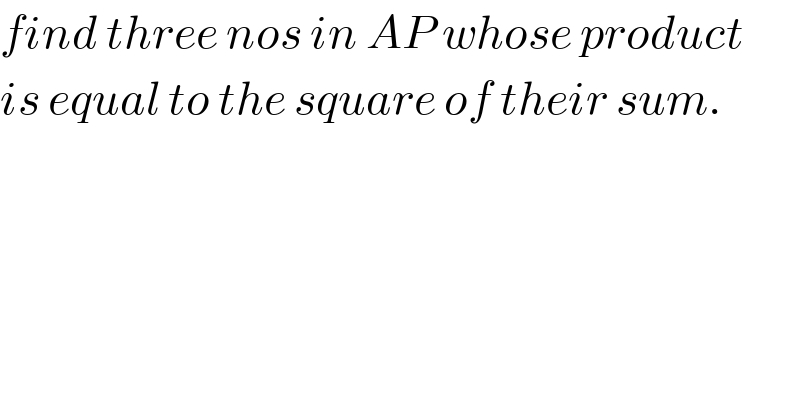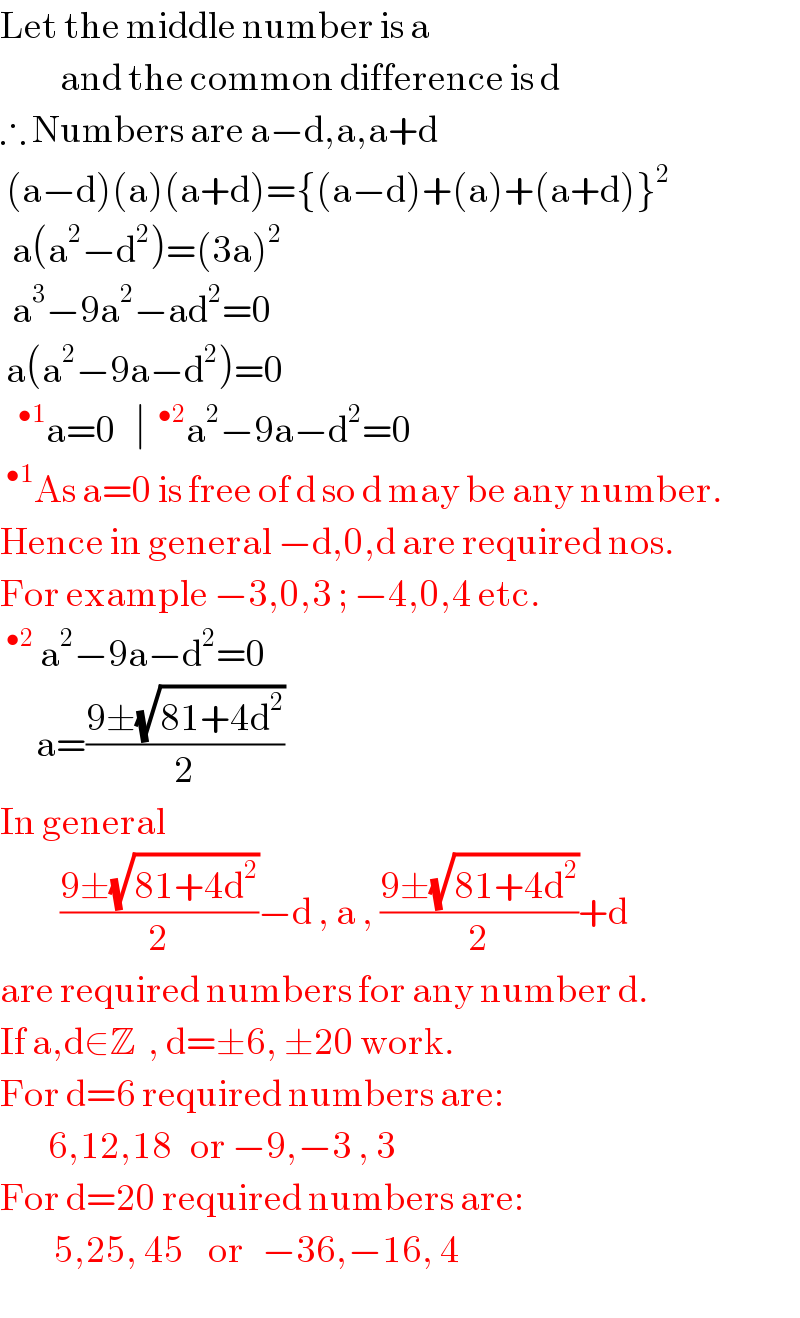Question Number 31281 by MURALI last updated on 05/Mar/18

$${find}\:{three}\:{nos}\:{in}\:{AP}\:{whose}\:{product} \\ $$$${is}\:{equal}\:{to}\:{the}\:{square}\:{of}\:{their}\:{sum}. \\ $$
Answered by Rasheed.Sindhi last updated on 07/Mar/18

$$\mathrm{Let}\:\mathrm{the}\:\mathrm{middle}\:\mathrm{number}\:\mathrm{is}\:\mathrm{a}\: \\ $$$$\:\:\:\:\:\:\:\:\:\:\mathrm{and}\:\mathrm{the}\:\mathrm{common}\:\mathrm{difference}\:\mathrm{is}\:\mathrm{d} \\ $$$$\therefore\:\mathrm{Numbers}\:\mathrm{are}\:\mathrm{a}−\mathrm{d},\mathrm{a},\mathrm{a}+\mathrm{d} \\ $$$$\:\left(\mathrm{a}−\mathrm{d}\right)\left(\mathrm{a}\right)\left(\mathrm{a}+\mathrm{d}\right)=\left\{\left(\mathrm{a}−\mathrm{d}\right)+\left(\mathrm{a}\right)+\left(\mathrm{a}+\mathrm{d}\right)\right\}^{\mathrm{2}} \\ $$$$\:\:\mathrm{a}\left(\mathrm{a}^{\mathrm{2}} −\mathrm{d}^{\mathrm{2}} \right)=\left(\mathrm{3a}\right)^{\mathrm{2}} \\ $$$$\:\:\mathrm{a}^{\mathrm{3}} −\mathrm{9a}^{\mathrm{2}} −\mathrm{ad}^{\mathrm{2}} =\mathrm{0} \\ $$$$\:\mathrm{a}\left(\mathrm{a}^{\mathrm{2}} −\mathrm{9a}−\mathrm{d}^{\mathrm{2}} \right)=\mathrm{0} \\ $$$$\:\:\:^{\bullet\mathrm{1}} \mathrm{a}=\mathrm{0}\:\:\:\mid\:\:^{\bullet\mathrm{2}} \mathrm{a}^{\mathrm{2}} −\mathrm{9a}−\mathrm{d}^{\mathrm{2}} =\mathrm{0} \\ $$$$\:^{\bullet\mathrm{1}} \mathrm{As}\:\mathrm{a}=\mathrm{0}\:\mathrm{is}\:\mathrm{free}\:\mathrm{of}\:\mathrm{d}\:\mathrm{so}\:\mathrm{d}\:\mathrm{may}\:\mathrm{be}\:\mathrm{any}\:\mathrm{number}. \\ $$$$\mathrm{Hence}\:\mathrm{in}\:\mathrm{general}\:−\mathrm{d},\mathrm{0},\mathrm{d}\:\mathrm{are}\:\mathrm{required}\:\mathrm{nos}. \\ $$$$\mathrm{For}\:\mathrm{example}\:−\mathrm{3},\mathrm{0},\mathrm{3}\:;\:−\mathrm{4},\mathrm{0},\mathrm{4}\:\mathrm{etc}. \\ $$$$\:^{\bullet\mathrm{2}} \:\mathrm{a}^{\mathrm{2}} −\mathrm{9a}−\mathrm{d}^{\mathrm{2}} =\mathrm{0} \\ $$$$\:\:\:\:\:\:\mathrm{a}=\frac{\mathrm{9}\pm\sqrt{\mathrm{81}+\mathrm{4d}^{\mathrm{2}} }}{\mathrm{2}} \\ $$$$\mathrm{In}\:\mathrm{general}\: \\ $$$$\:\:\:\:\:\:\:\:\:\:\frac{\mathrm{9}\pm\sqrt{\mathrm{81}+\mathrm{4d}^{\mathrm{2}} }}{\mathrm{2}}−\mathrm{d}\:,\:\mathrm{a}\:,\:\frac{\mathrm{9}\pm\sqrt{\mathrm{81}+\mathrm{4d}^{\mathrm{2}} }}{\mathrm{2}}+\mathrm{d} \\ $$$$\mathrm{are}\:\mathrm{required}\:\mathrm{numbers}\:\mathrm{for}\:\mathrm{any}\:\mathrm{number}\:\mathrm{d}. \\ $$$$\mathrm{If}\:\mathrm{a},\mathrm{d}\in\mathbb{Z}\:\:,\:\mathrm{d}=\pm\mathrm{6},\:\pm\mathrm{20}\:\mathrm{work}. \\ $$$$\mathrm{For}\:\mathrm{d}=\mathrm{6}\:\mathrm{required}\:\mathrm{numbers}\:\mathrm{are}: \\ $$$$\:\:\:\:\:\:\:\:\mathrm{6},\mathrm{12},\mathrm{18}\:\:\:\mathrm{or}\:−\mathrm{9},−\mathrm{3}\:,\:\mathrm{3} \\ $$$$\mathrm{For}\:\mathrm{d}=\mathrm{20}\:\mathrm{required}\:\mathrm{numbers}\:\mathrm{are}: \\ $$$$\:\:\:\:\:\:\:\:\:\mathrm{5},\mathrm{25},\:\mathrm{45}\:\:\:\:\mathrm{or}\:\:\:−\mathrm{36},−\mathrm{16},\:\mathrm{4} \\ $$
